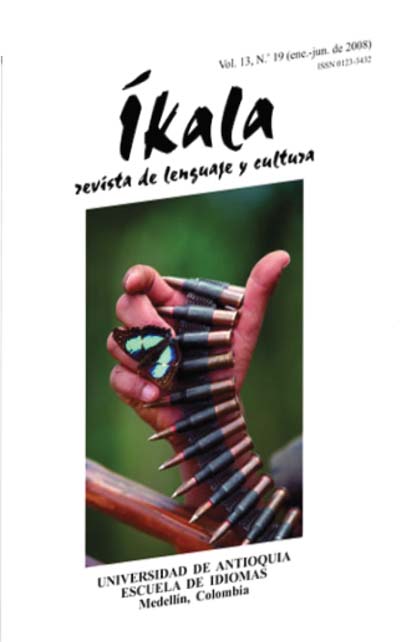De l'usage des pronoms personnels dans deux traductions espagnoles de Tartuffe.
DOI :
https://doi.org/10.17533/udea.ikala.2693Mots-clés :
Traduction en Espagne, théâtre, pronoms personnels, perspective diachronique.Résumé
Cet article a pour but de présenter les résultats d'une recherche concernant l'emploi des pronoms personnels dans deux traductions espagnoles de l'œuvre moliéresque Tartuffe, distantes de près de deux siècles (José Marchena, 1811 ; Encarnación García Fernández et Eduardo J. Fernández Montes, 1984). L'analyse comparative entre les systèmes d'énonciation offre un éclairage intéressant concernant la notion d'adaptation culturelle dans le cadre d'un texte dramatique, tout en mettant l'accent sur l'évolution diachronique de la conception de la traduction en Espagne.
Reçu: 12-10-2007/ Accepté: 27-02-2008
Comment citer cet article:
Boudart, L. (2008). De l'usage des pronoms personnels dans deux traductions espagnoles de Tartuffe. Íkala. 13(1), pp.105-118.
Téléchargements
Références
Darbelnet, J. (1977). Niveaux de traduction, Babel nº1, vol. XXXIII, pp. 6-16.
Díaz-Plaja, F. (1986). El abate Marchena, su vida, su tiempo, su obra. Léon: Universidad de León.
ESPI, M-J. (1995). Analyse du discours, analyse contrastive et traduction espagnol-français. Langues et linguistique, nº 21. Québec: Université Laval. Lafarga, F. (1997). El Teatro europeo en la España del siglo XVIII. Lleida: Universitat de Lleida.
Lafarga, F. (1999). La traducción en España (1750-1830) Lengua, literatura, cultura. Lleida: Edicions de la Universitat de Lleida.
Lafarga, Dengler (eds.) (1995) Teatro y traducción. Barcelona: Universitat Pompeu Fabra.
Molière (1990). Tartufo, edición de Encarnación García Fernández y Eduardo J. Fernández Montes. Madrid: Letras
universales, Cátedra.
Molière (2001). Tartuffe. Paris: Librio Flammarion.
Molière (1977). Tres comedias, edición preparada por Francisco Javier Hernández. Madrid: Editora Nacional, Biblioteca de la literatura y del pensamiento.
Wilmet, M. (1998). Grammaire critique du français. Paris/Bruxelles: Hachette supérieur/Duculot.
Téléchargements
Publié-e
Comment citer
Numéro
Rubrique
Licence
(c) Tous droits réservés Íkala, Revista de Lenguaje y Cultura 2008

Cette œuvre est sous licence Creative Commons Attribution - Pas d'Utilisation Commerciale - Partage dans les Mêmes Conditions 4.0 International.












